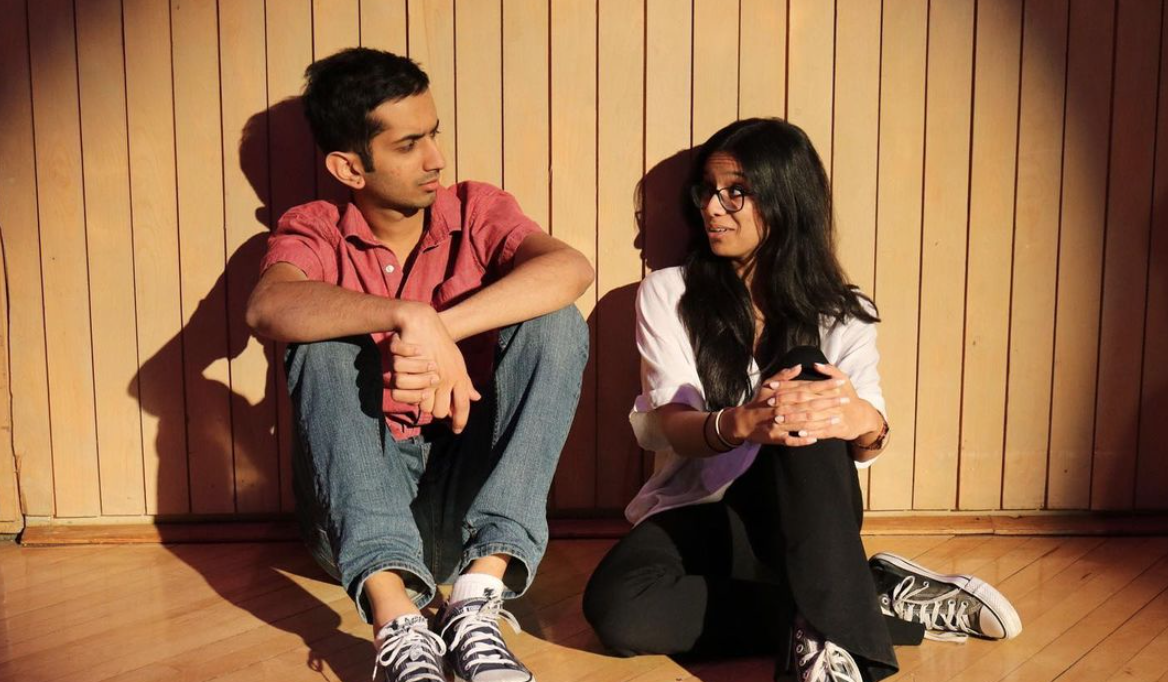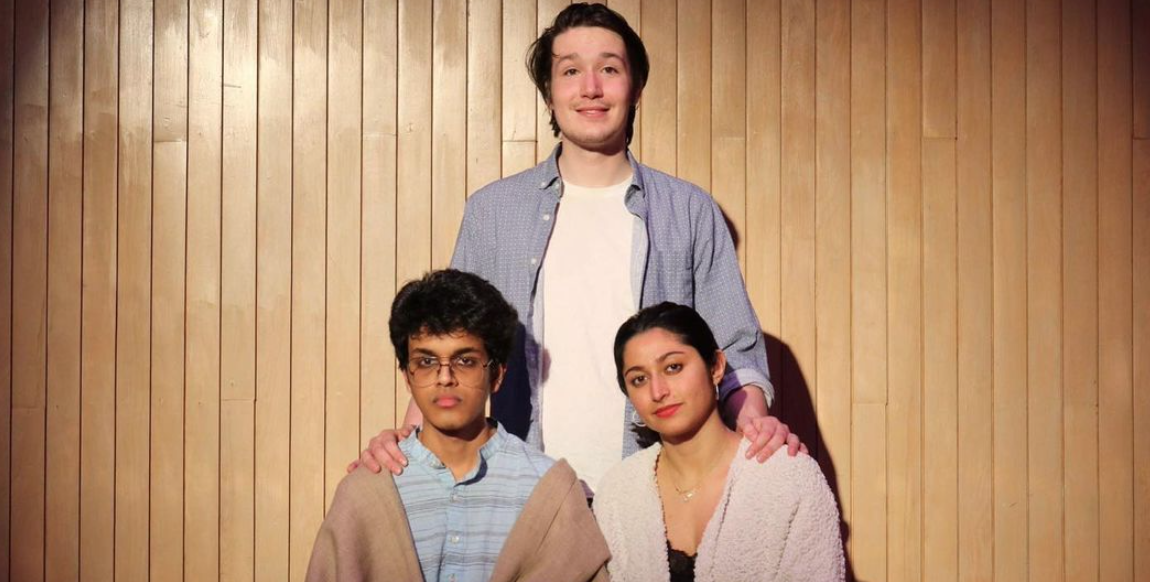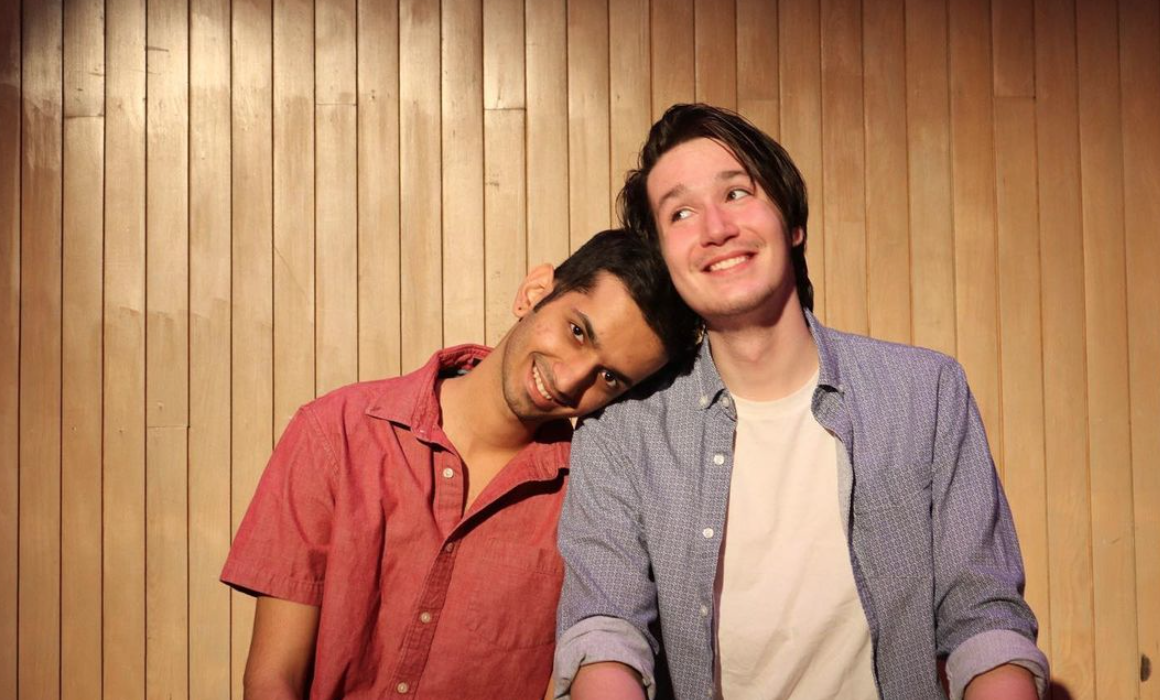“A Nice Indian Boy” will be performed on April 23rd and 24th at 4:30pm in the Filene Hall auditorium. Tickets are free and out now, here.
More information can be found on the play’s Instagram page.
As a part of his independent study in Theater, Arham Hashmi ‘23 is currently directing the first South Asian play to ever be performed at Skidmore: "A Nice Indian Boy" by award-winning playwright and screenwriter, Madhuri Shekar. It is a comedic play about an Indian man named Naveen, who expresses to his family his wants to marry another man through a traditional Hindu wedding. The play utilizes comedy to address deeper themes of queerness, heritage, and marriage within the context of the traditional Hindu culture.
The cast and crew team are comprised of Skidmore students, along with the faculty advisor for Hashmi’s independent study, Dennis Jackson Schebetta:
Cast
Pranav Vaidyanathan as Naveen
Seamus Signorelli as Keshav
Sruti Ramaswamy as Megha
Kartik Vaish as Archit
Arya Kamble as Arundhati
Team
Assistant Director: Sanjana Salian
Stage Manager: Anne Jainta
Deputy Stage Manager: Kevin Xue
Treasurer: Iti Singh
Ensemble
Narrators: Anna de Carvalho
Dancers: Anjali Khanna (Leader) & Sarita Padukone
The Skidmore News was thrilled to have the chance to interview Hashmi about the production that they’re producing that will go up on April 23rd and 24th in Filene Hall. They were able to give insight on their directing process, the collaboration with the cast, and the importance of telling this story, especially at Skidmore College.
Naveen and Arundhati, played by Pranav Vaidyanathan (left) and Arya Kamble (right).
Smith: What is the premise of “A Nice Indian Boy?”
Hashmi: There are quite a few interpretations on what this play is about. It’s about this Indian American family and their son that came out six months ago. Now, he wants a traditional Hindu marriage in a very heteronormative culture…It’s about marriages in Indian culture and how arranged marriages or love marriages work. Historically, people fell in love, then their families would meet, then the marriage would happen. So the question here is how would things change if you put that highly heteronormative process on a gay couple? In my direction, one of the main focuses is definitely the queerness of the relationship. I’m handling it is more about how this needs to be talked about because South Asian gays don’t come out that often, and now they’re getting married.
Smith: Is this one of your first directing experiences?
Hashmi: This is my first directing experience. It’s a part of my independent study in Theater. Last year, Sanjana, who is the assistant director of the show, and I were in an intro to acting class together and we did a scene from this play as our final project. Dennis Jackson Schebetta, the faculty advisor for the class asked if any of us wanted to take up directing a staged reading of it at Skidmore. This isn’t my first time working with the play, but it is my first time directing. I wanted to take the intro to directing class, at the end of which I would be directing a scene, but it didn’t work with my schedule, so Dennis suggested taking on an independent study. And I’m learning great things along the way. I don’t expect the production or the reading to be perfect because it is my first, but people are having fun. I’m having fun. My cast is having fun. That’s the goal!
Archit, Keshav, and Megha, played by Kartik Vaish (left), Seamus Signorelli (middle), and Sruti Ramaswamy (right).
Smith: What have your rehearsals been like? Is there a specific structure or ritual that can be seen in some theater production rehearsals?
Hashmi separated their overall rehearsal process into "spells" or “rehearsal stages with specific goals."
Hashmi: The first spell was just sitting, reading the scenes, and talking about the choices we’d make. The second spell, which just started yesterday, was more of doing the action as you say things. The third spell would be with the props and the set. In terms of one additional thing we’ve done,the entire cast has Indian names. This is what I call them during the rehearsals. But there is an entire team of stage managers and narrators that just use their regular names… so we’ve tried giving them Indian names as well, so that they’re all included.
Smith: You mention that dance exists in the production; what role does dance play in the show?
Hashmi: Although dance isn’t included in the script, dance is my addition to it to make it more of a Bollywood theater production. The dancers and narrators will be running their own show in transitions to interact with each other. Sometimes they’ll be dancing, sometimes they’ll be speaking with the audience. They also give the audience insight into things that they might not know about. The narrators and dancers will be the audience's connection with the cast. We’re making the show more of a reading so that the cast is reading the show with the audience.
Smith: Why did you want it to be more of a reading?
Hashmi: First reason, time. I’m getting three credits, [as part of their independent study] but the cast is volunteering. I wanted to give my cast something they can enjoy without stressing about it. They’re giving three hours a week [of their time to the production]. Going forward they’ll be giving me more time. Second was my own experience. As this is my first experience, I didn’t want it to be a huge production. I think the actors and production team are going above and beyond… We’re using lights and music and everything. Initially the idea was to have six chairs with the characters and they’d stand up and say their lines and stuff like that. But what it’s become now is something more of a show.
Smith: Is the cast involved in the South Asian cultural club Hayat, as I know your outreach started there?
Hashmi: Surprisingly, no. It is still a Hayat event and things will be done under Hayat. In terms of racial diversity, it's a very South Asian cast. Even the white [actor] in the cast is adopted by Indian parents.
This was an interesting fact given that in the details of the play, the character, Keshav, is supposed to be a white male that had been adopted by Indian parents. The cast is not exclusively Indian as one might expect: they are from all different parts of South Asia. Hashmi spoke about the casting process not necessarily being ideal in terms of fitting all of the identities in the script; however, it has created a new experience for all of the cast, given that Hashmi is from Pakistan and is more familiar with their own culture.
Hashmi: “I thought it was going to be all Hayat people. There’s one person in the cast that is on the Hayat e-board [Kartik Vaish]. I have worked with my leads in the e-board in the past. Most of them I have not worked with before. One of them, Arya, has just come to Skidmore. I have not worked with her before and she has conquered that role.
Naveen and Keshav, played by Pranav Vaidynathan (left) and Seamus Signorelli (right).
Smith: "Because the cast members know each other well, I was wondering if it is difficult to maintain professionalism and seriousness in the performance?".
Hashmi: That actually has been one of our challenges, I was just meeting with Dennis this afternoon. He was at one of the rehearsals last night and told me today “tell your actors not to be nice to each other; ” they’re fighting but they’re saying the mean things in a very calm way because they actually like each other and care about each other. I’m glad it’s a new group [that isn’t very familiar with each other], so they have more of that flexibility in terms of using different emotions with each other. I try to close the rehearsals every day on Monday at 9pm by telling them to make a ball out of their characters, throw them, leave without the characters, and step outside because it [the play] also addresses heavy themes. It addresses divorce. It addresses coming out. A lot of these things that they may not have had discussions about before.
Smith: Why is “A Nice Indian Boy” an important story to tell, especially at Skidmore?
Hashmi: First, it's funny. It’s like a rom-com. It’s lighthearted, but also addresses [deeper issues]. I write as well and I’ve always found comedy as an effective tool to make a statement about things. If it’s embedded in a joke, as long as it’s coming from the person who is appropriate to make that joke, it is really strong. There are many moments in the play where they talk about heavy issues and there’s a joke with it; so people get to laugh at it for a moment and then think deeper. In terms of why this story’s important is because it has not been seen much before in terms of both the general world and Skidmore. I believe this will be the first South Asian centric play at Skidmore. There have been queer-centric plays at Skidmore, but there definitely needs to be more in terms of representation –so many identities fall under the one term “queer.” But, the identities of both South Asia and queer: the reason I’m telling the story is because it’s me. I think it’s about time people see gay couples getting married and people other than hetrosexual or cisgender people on stage. People who invalidate the queer struggle [often make it seem as if the only thing we do or care about involves] dealing with our struggles, fighting for our rights, and correcting people wherever we go. We do a lot of other stuff as well. We have other professions and other passions. So I think that’s a story where the play begins. There are two guys, one South Asian and one white. And they want to get married. And you’re not supposed to be like, “Oh my god what a huge thing!” It’s a normal thing.
Smith: What do you think the audience should be cognizant of while watching the show or before?
Hashmi: My advice would be for them to be open to a new culture that they [maybe] haven’t seen before. They will be seeing different dynamics [in a family and in a couple]. Also, they should be open to the crossover or patterns between a white queer experience and queer experience of color. Even though this white man is very Indian, how much more does his skin color give privilege than the brown man born in the US? The conversations that people might not have had before will be a part of it. Some of it might be triggering for people who have been through similar experiences. One request I have for people…it’s my first time doing this. It’s my actors’ first time doing this. And the casting isn’t the most authentic in terms of sexual identities, because some of those people who fit the eligibility for these characcters, were not very comforable coming up to the stage and expressing themselves in front of the Skidmore community and I definitely understand that. So if any of these characters deviate a little bit from how these characters usually behave, it’s not because they don’t care about it. They’re doing their best to understand how queer relationships work, but it’s just because this is their first exposure to it. We hope that it will be a fun experience regardless!


